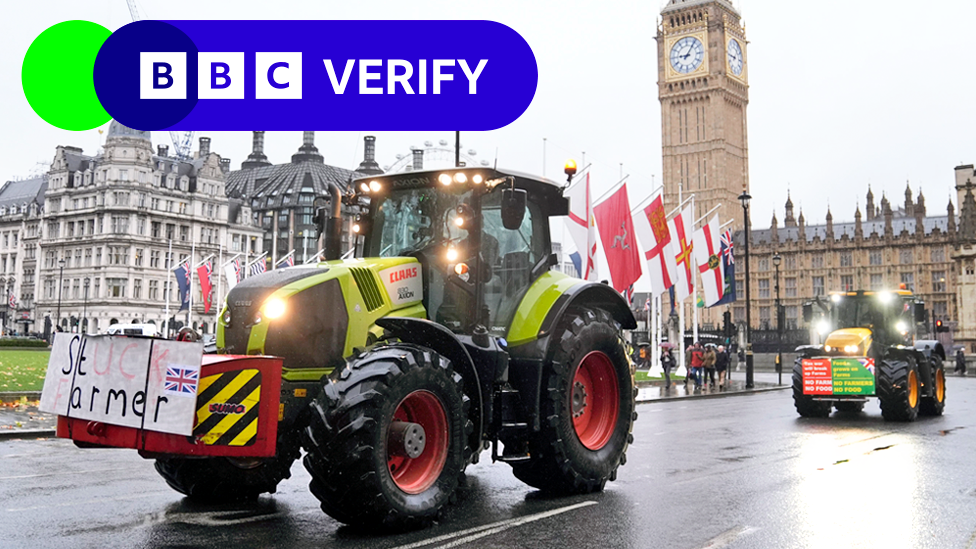U-turn on Welsh farm tree rule after backlash
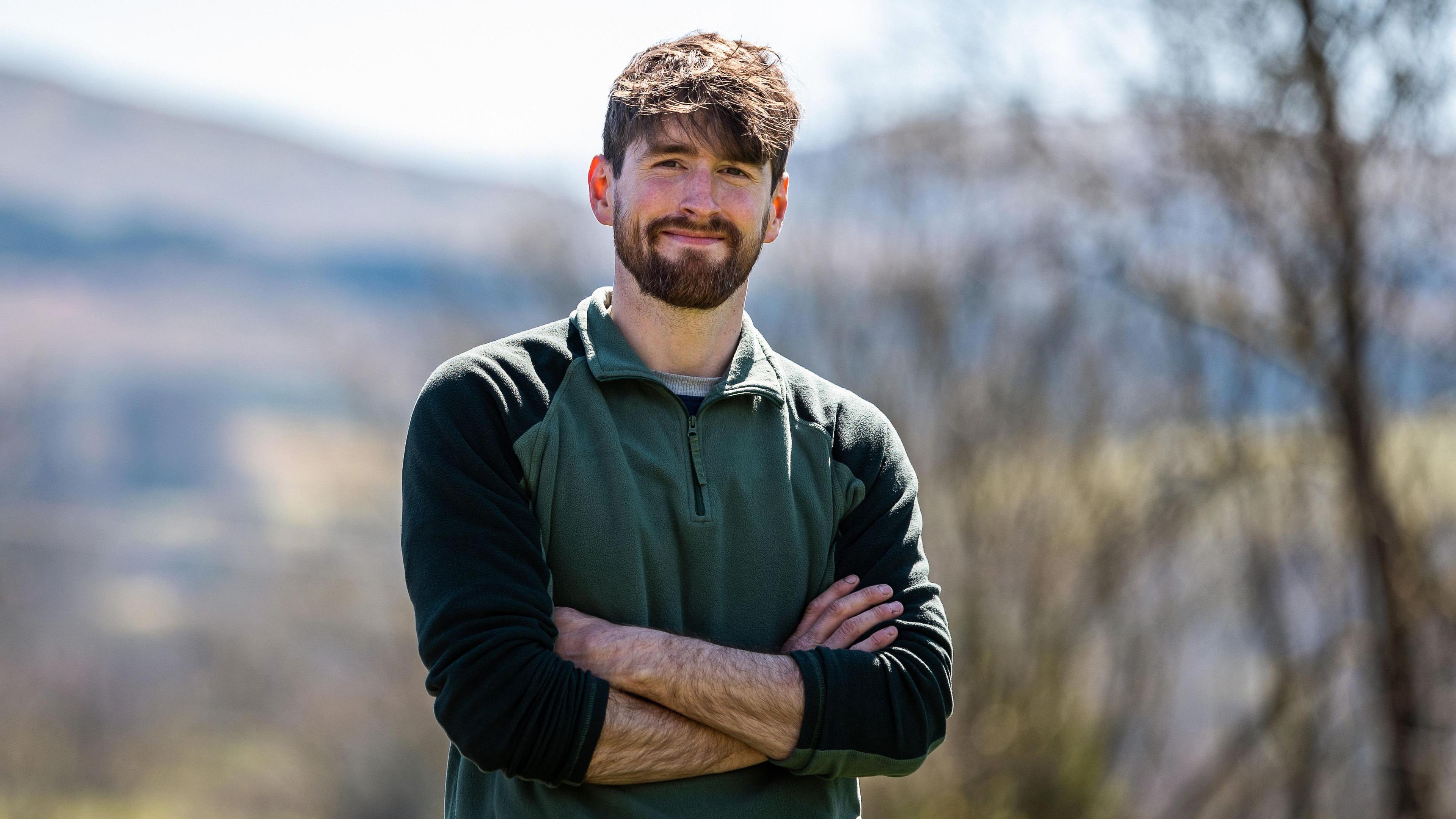
Rhys Evans runs a family farm and largely supports plans to change rules on tree coverage
- Published
Plans to require Welsh farmers to have trees on 10% of their land in order to qualify for government funding have been dropped after widespread protests.
The requirement was part of planned changes to Welsh farming subsidies through the Sustainable Farming Scheme (SFS), which is to be introduced in 2026.
Now it is set to be replaced by "a tree planting and hedgerow creation plan", which farmers would need to start to make progress on with a view to delivering this by 2030.
In a speech at the Royal Welsh Winter Fair in Llanelwedd, Powys, Deputy First Minister Huw Irranca-Davies said "it was clear changes were needed - we said we would listen - and we've done just that".
The farmers growing food in garages and barns
- Published24 July 2024
Plan to create new national park for Wales
- Published20 November 2023
Wales is first country to map rare creepy crawlies
- Published27 December 2023
The new requirement would help farmers gain access to the "universal" layer of funding, with tree-planting grants available in an "optional" layer, designed to reward farms willing to go above and beyond the entry-level requirements.
There will also be an overall target set for the amount of additional tree cover provided by the subsidy scheme as a whole, though this figure is yet to be decided.
Other changes to the original plans include cutting the checklist of actions farmers would have to sign up to in order to access the scheme's universal layer from 17 to 12.
This includes moving a requirement for all farms to manage and create new ponds, and have wash stations to the scheme's optional layer.
A range of tasks around animal health, welfare and biosecurity have been merged into one.
Farms are still being asked to manage 10% of their land as habitat for wildlife under the new proposals.
Irranca-Davies, who also has responsibility for rural affairs, said he remained "committed to listening to and working with our stakeholders to ensure the final scheme... will help support the economic resilience of farming businesses, the sustainable production of food, our climate and nature objectives and our rural communities for current and future generations".
The changes come shortly after large, separate, protests in Llandudno, Conwy, and Westminster against UK government changes to inheritance tax for farmers.
'Commitment to collaboration'
Farming leaders said progress had been made and praised Irranca-Davies's "commitment to collaboration".
Victoria Bond, director of the County Land and Business Association (CLA) in Wales said "today's updated SFS shows a shift in the right direction".
Ian Rickman, president of the Farmers' Union of Wales, said the announcement was the culmination of "intense" work over recent months.
"We must now ensure that the associated budget and payment methodology deliver real economic stability for our family farms in Wales as we face a backdrop of many other challenges," he said.
Mr Rickman said recent months had involved "a huge amount of work" and the union's ambition had been "to get to a scheme that's accessible to all farmers".
Wildlife Trusts Wales director Rachel Sharp said the announcement showed how farmers' concerns could be addressed.
She said it would be critical to support the many farmers "who want to go beyond this if we are to see nature restored in Wales".
Alexander Phillips, of WWF Cymru said the Welsh government needed to deliver an SFS that helped meet Wales' 2030 targets around nature restoration and tree planting.
Conservative Shadow Secretary of State for Wales, Mims Davies, accused the Welsh government of confusing farmers.
“This latest saga is another example of the left hand not knowing what the right hand is doing."
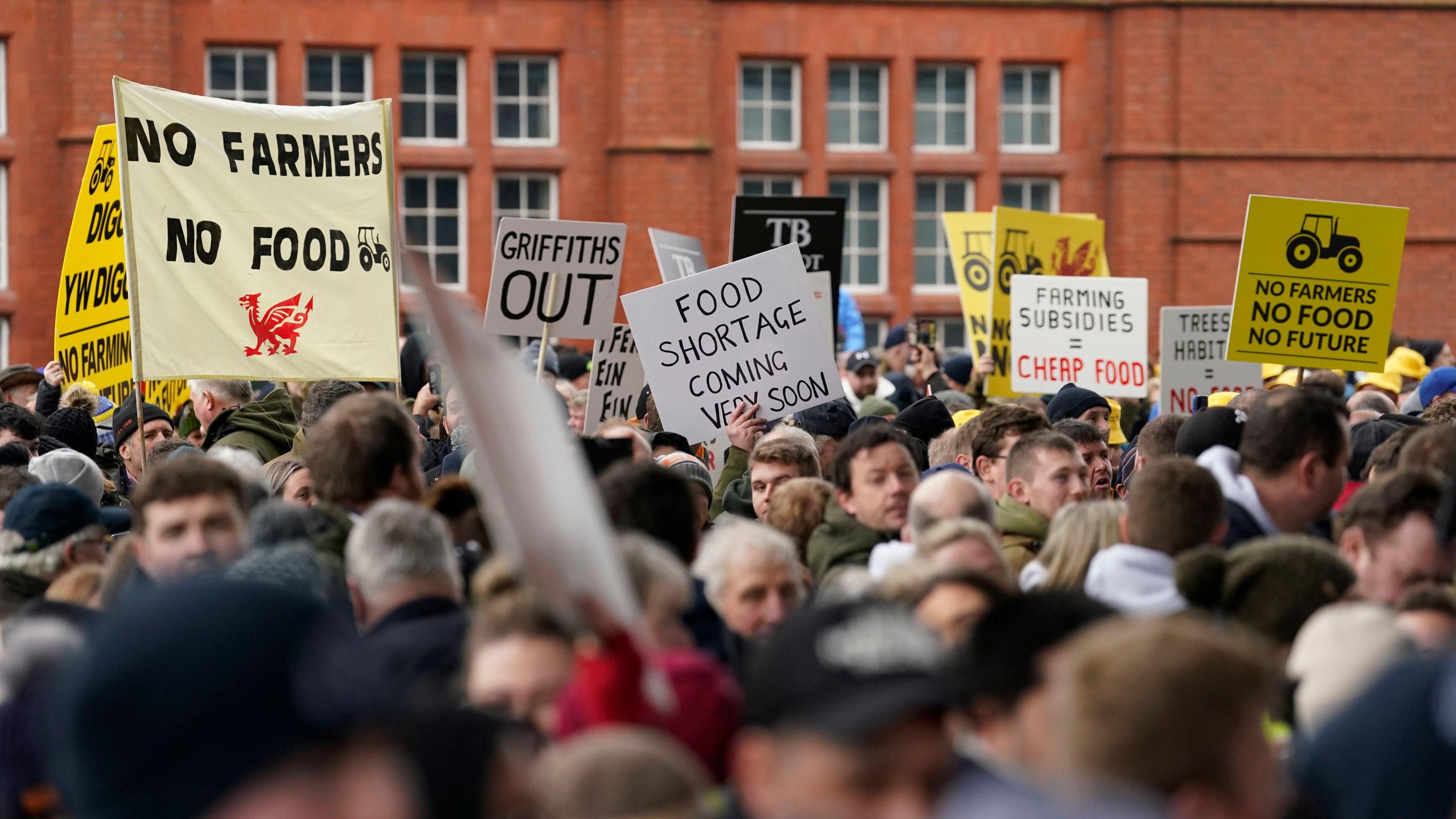
About 3,000 farmers protested against the proposals in February
Farms are still being asked to manage 10% of their land as habitat for wildlife under the new proposals.
It is something Gwynedd sheep and cattle farmer Rhys Evans, director of the Nature Friendly Farming Network in Wales, had been hoping to see, arguing it could help make businesses more productive and resilient to the effects of climate change
His hill farm and 10 others have recently planted 7km (4.3 miles) of hedgerows, including 50,000 trees, dug ponds and restored peatland.
Mr Evans said he hoped ministers would stick with asking farmers to manage some of their land as wildlife habitat, arguing it could help make businesses more productive and resilient to the effects of climate change.
"This isn't about fencing off a piece of land and forgetting about it - many of the habitats we have here on the farm are still grazed by animals and are incorporated into food production," he said.
He had called for more flexibility on the tree cover rule, with the opportunity for farms to work with experts to plant "the right tree in the right place for the right reason".
Farming unions had called for the requirement to be scrapped, branding it "unworkable" and a "barrier".
Supporters such as The Woodland Trust said the average tree cover on Welsh farms was between 6% and 7%, so the proposal was "relatively modest".
What happens next?
An updated economic analysis and impact assessment is set to be carried out on the revised proposals, with a final decision next summer.
The Welsh government said farmers would not find out about payment rates until this point, while farmers argued they needed this information to plan ahead.
They also expressed concerns as to the scheme's overall budget, which is yet to be announced.
What is the Sustainable Farming Scheme?
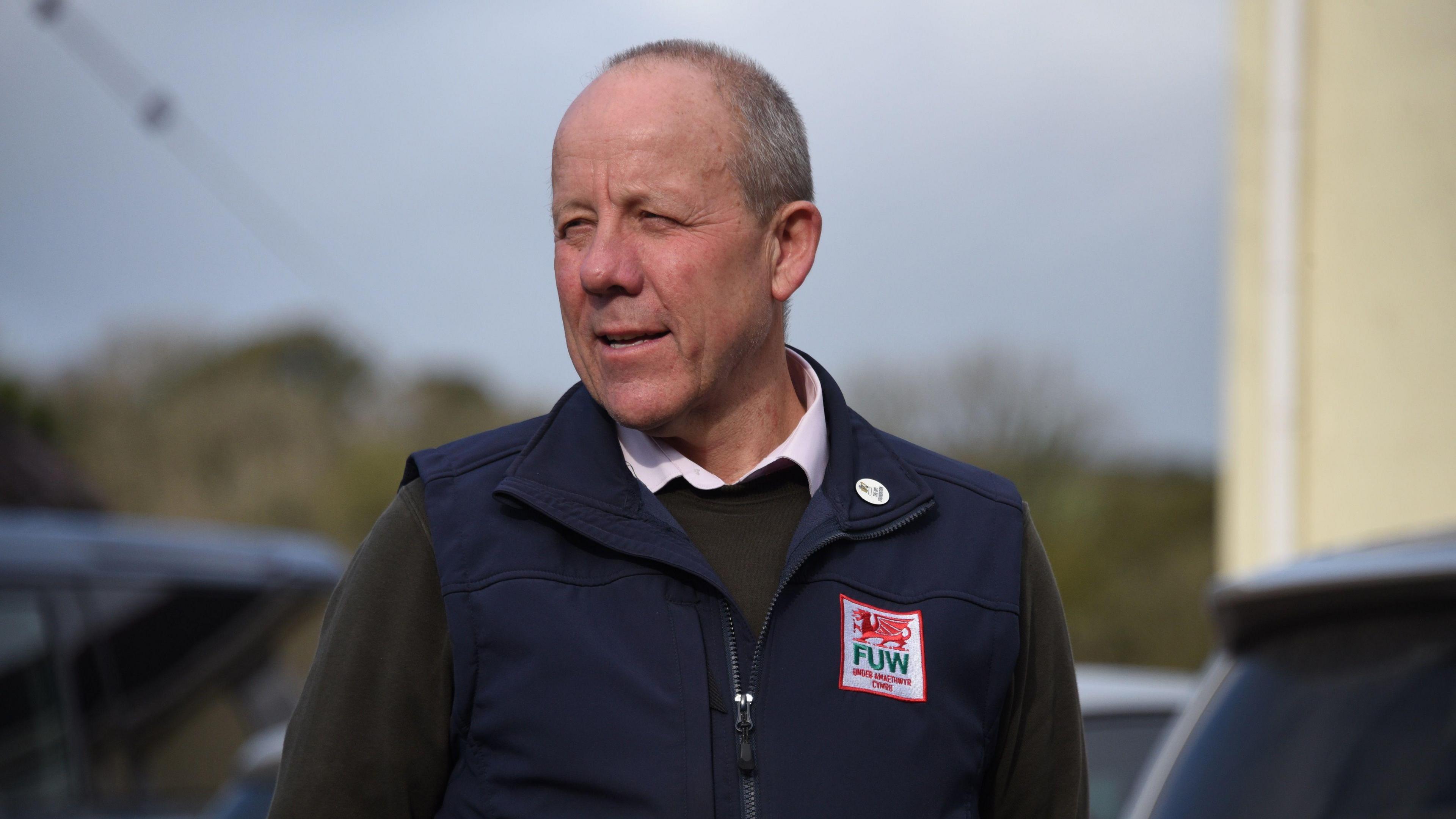
Ian Rickman, president of the Farmers' Union of Wales, said there was a "lack of clarity" over the budget available for the new funding scheme
The SFS is the Welsh government's big new plan for post-Brexit farming subsidies.
Under the EU system, farms used to receive funding largely based on how much land they had, with this new approach focusing on rewarding "sustainable farming" practices.
As about 90% of the Welsh landscape is looked after by farmers, the argument is they have a key role to play in tackling climate change and the current decline in wildlife.
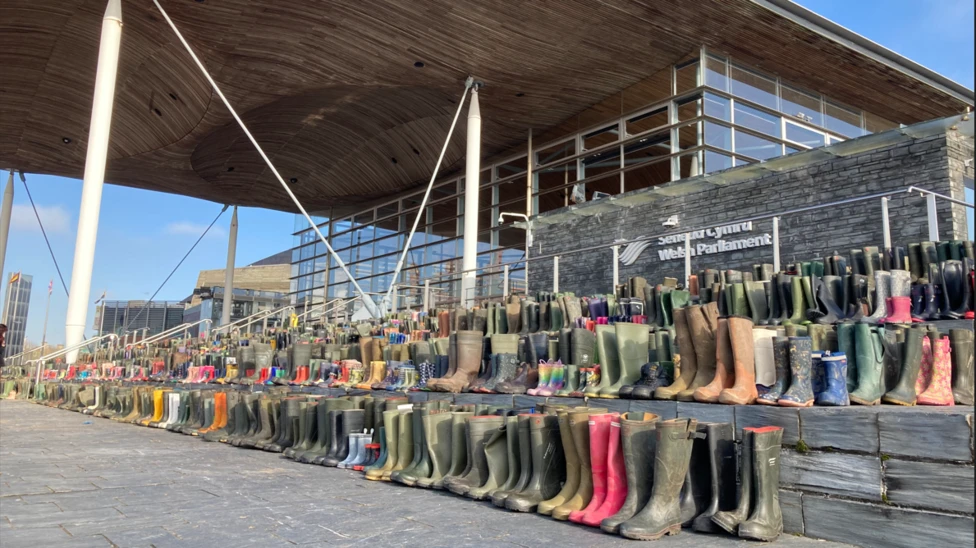
Thousands of wellies were placed in front of the Welsh parliament in March in protest
Why did it lead to protests?
On average, 67% of Welsh farm income comes from subsidies, external and this change in how they are handed out is the biggest in a generation.
Farming unions seized on an economic impact assessment published alongside the proposals in December 2023, claiming it implied thousands of jobs would be lost - although this interpretation was disputed by the Welsh government.
It came at a time when the industry was feeling under pressure over a range of other issues.
- Published28 February 2024
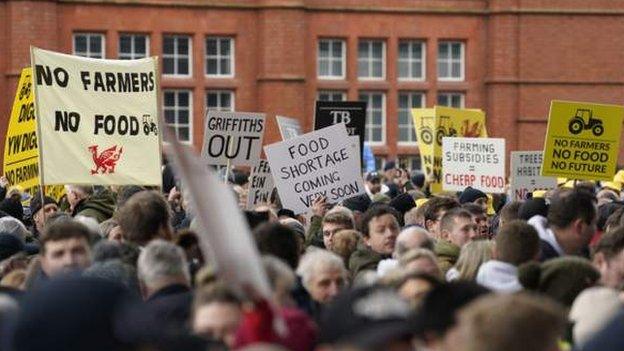
- Published24 November 2024
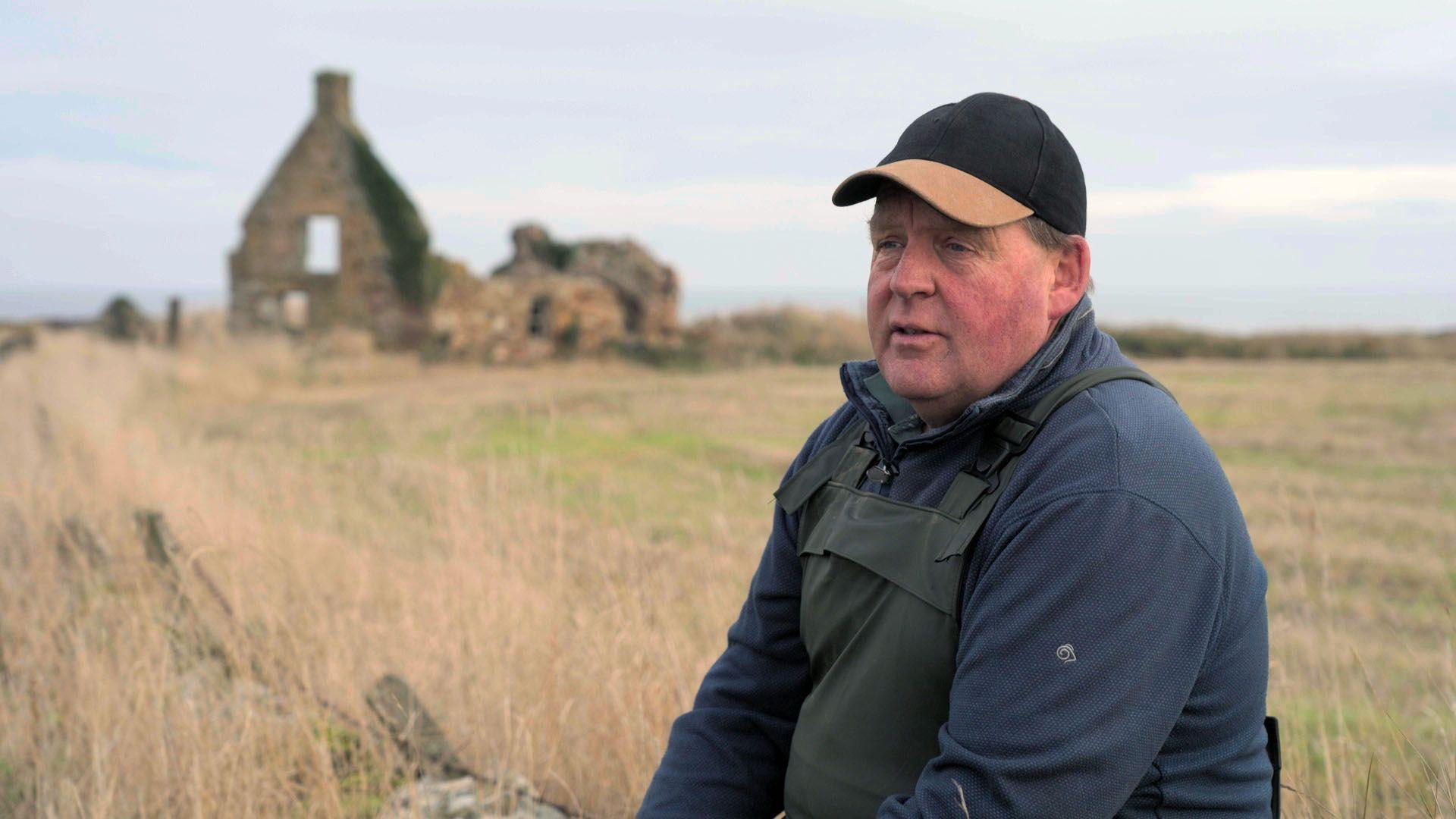
- Published22 November 2024
